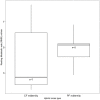Hybrid Dysfunction Expressed as Elevated Metabolic Rate in Male Ficedula Flycatchers
- PMID: 27583553
- PMCID: PMC5008804
- DOI: 10.1371/journal.pone.0161547
Hybrid Dysfunction Expressed as Elevated Metabolic Rate in Male Ficedula Flycatchers
Erratum in
-
Correction: Hybrid Dysfunction Expressed as Elevated Metabolic Rate in Male Ficedula Flycatchers.PLoS One. 2017 Jul 20;12(7):e0181288. doi: 10.1371/journal.pone.0181288. eCollection 2017. PLoS One. 2017. PMID: 28727790 Free PMC article.
Abstract
Studies of ecological speciation are often biased towards extrinsic sources of selection against hybrids, resulting from intermediate hybrid morphology, but the knowledge of how genetic incompatibilities accumulate over time under natural conditions is limited. Here we focus on a physiological trait, metabolic rate, which is central to life history strategies and thermoregulation but is also likely to be sensitive to mismatched mitonuclear interactions. We measured the resting metabolic rate of male collared, and pied flycatchers as well as of naturally occurring F1 hybrid males, in a recent hybrid zone. We found that hybrid males had a higher rather than intermediate metabolic rate, which is indicative of hybrid physiological dysfunction. Fitness costs associated with elevated metabolic rate are typically environmentally dependent and exaggerated under harsh conditions. By focusing on male hybrid dysfunction in an eco-physiological trait, our results contribute to the general understanding of how combined extrinsic and intrinsic sources of hybrid dysfunction build up under natural conditions.
Conflict of interest statement
The authors have declared that no competing interests exist.
Figures


Similar articles
-
Relative performance of hybrid nestlings in Ficedula flycatchers: a translocation experiment.Ecol Evol. 2013 Feb;3(2):356-64. doi: 10.1002/ece3.472. Epub 2013 Jan 9. Ecol Evol. 2013. PMID: 23467681 Free PMC article.
-
Natural and sexual selection against hybrid flycatchers.Proc Biol Sci. 2008 Mar 22;275(1635):735-44. doi: 10.1098/rspb.2007.0967. Proc Biol Sci. 2008. PMID: 18211878 Free PMC article.
-
Positive feedback between ecological and reproductive character displacement in a young avian hybrid zone.Evolution. 2012 Apr;66(4):1167-79. doi: 10.1111/j.1558-5646.2011.01518.x. Epub 2011 Dec 14. Evolution. 2012. PMID: 22486696
-
Ecology and genetics of speciation in Ficedula flycatchers.Mol Ecol. 2010 Mar;19(6):1091-106. doi: 10.1111/j.1365-294X.2010.04568.x. Epub 2010 Feb 15. Mol Ecol. 2010. PMID: 20163542 Review.
-
Climate adaptation and speciation: particular focus on reproductive barriers in Ficedula flycatchers.Evol Appl. 2015 Jun 30;9(1):119-34. doi: 10.1111/eva.12276. eCollection 2016 Jan. Evol Appl. 2015. PMID: 27087843 Free PMC article. Review.
Cited by
-
The metabolic costs of meiotic drive.Proc Biol Sci. 2025 Jul;292(2050):20250779. doi: 10.1098/rspb.2025.0779. Epub 2025 Jul 2. Proc Biol Sci. 2025. PMID: 40592454 Free PMC article.
-
Hybridization, sex-specific genomic architecture and local adaptation.Philos Trans R Soc Lond B Biol Sci. 2018 Oct 5;373(1757):20170419. doi: 10.1098/rstb.2017.0419. Philos Trans R Soc Lond B Biol Sci. 2018. PMID: 30150218 Free PMC article. Review.
-
Regulatory and evolutionary impact of DNA methylation in two songbird species and their naturally occurring F1 hybrids.BMC Biol. 2024 May 29;22(1):124. doi: 10.1186/s12915-024-01920-2. BMC Biol. 2024. PMID: 38807214 Free PMC article.
-
Correction: Hybrid Dysfunction Expressed as Elevated Metabolic Rate in Male Ficedula Flycatchers.PLoS One. 2017 Jul 20;12(7):e0181288. doi: 10.1371/journal.pone.0181288. eCollection 2017. PLoS One. 2017. PMID: 28727790 Free PMC article.
-
Differences in incubation behaviour and niche separation of two competing flycatcher species.Behav Ecol Sociobiol. 2020;74(8):105. doi: 10.1007/s00265-020-02883-4. Epub 2020 Aug 1. Behav Ecol Sociobiol. 2020. PMID: 32801426 Free PMC article.
References
-
- Schluter D. The ecology of adaptive radiation: OUP; Oxford; 2000.
-
- Nosil P. Ecological Speciation. Oxford ser ed Oxford: Oxford University Press; 2012. 304 p.
-
- Rundle HD, Nosil P. Ecological speciation. Ecology letters. 2005;8(3):336–52.
-
- Dieckmann U, Doebeli M, Metz J, Tautz D. Adaptive speciation. Cambridge studies in adaptive dynamics. Cambridge, UK: Cambridge University Press; 2004.
-
- Turelli M, Barton NH, Coyne JA. Theory and speciation. Trends in Ecology & Evolution. 2001;16(7):330–43. - PubMed
MeSH terms
LinkOut - more resources
Full Text Sources
Other Literature Sources

